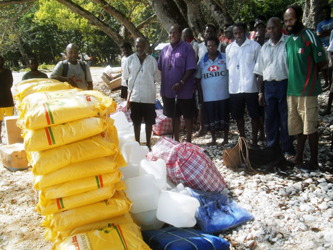ABM Archive Website
THIS WEBSITE CONTAINS ARCHIVE MATERIALS FOR HISTORICAL REFERENCE ONLY
For up-to-date information, including our latest appeals, news, and resources, please visit our current website.
International Day for Disaster Reduction – 13 October, 2015
October 12, 2015

“Traditional and indigenous knowledge is the indispensable information base for many societies seeking to live in harmony with nature and adapt to disruptive weather events, a warming globe and rising seas.”
– UN Secretary-General Ban Ki-moon
The United Nation’s International Day for Disaster Reduction is observed on 13th October as a way to promote a global culture of disaster reduction, including disaster prevention, mitigation and preparedness.
The theme for 2015 is Knowledge for Life. More information may be found on the website
www.unisdr.org/2015/iddr.
“The focus of this year’s International Day for Disaster Reduction is on the traditional, indigenous and local knowledge which complement modern science and add to an individual’s and societies’ resilience. For example, knowledge of early warning signals in nature can be vital to ensuring early action is taken to mitigate the impact of both slow and fast onset disasters such as droughts, heatwaves, storms and floods. Combined with scientific knowledge such as reports generated by meteorologists, local knowledge is vital for preparedness and can be passed on from generation to generation.” (www.un.org)
ABM AND EMERGENCIES
The Anglican Board of Mission (ABM)supports our partners not only by providing emergency relief aid, but also by helping to prepare them for emergency situations and educating them on methods to mitigate the effects of climate change.
We work with partners in countries such as the Solomon Islands, Vanuatu, South Sudan and the Philippines to prepare communities for possible emergencies and to raise awareness of the importance of disaster preparedness.
When Cyclone Pam struck Vanuatu in March 2015, ABM was able to send funds in support of the Anglican Church of Melanesia’s emergency relief efforts. However, the emergency also emphasised the importance of planning for disaster risk reduction. Read ABM staff member Jess Sexton’s account from a monitoring trip this year, Importance of Disaster Risk Reduction in Vanuatu.
PASTORS AND DISASTERS TOOLKIT
In December 2014, Episcopal Relief & Development and a working group of twelve international partner agencies including ABM, published “Pastors and Disasters: a Toolkit for Community-Based Disaster Risk Reduction & Management” to improve disaster response efforts within the Anglican relief and development community.
This toolkit is the culmination of three years of collaborative effort to create, adapt and field-test resources that can be used in a variety of contexts, based on local resources and expertise. The working group included partners from Africa, Asia, the Pacific, Latin America and the United States. Read about the official launch here.
INTERNATIONAL PANEL OF EXPERTS SHARE EXPERIENCES ON DAY FOR DISASTER REDUCTION
View Episcopal Relief and Development’s blog post featuring an international panel of five experts sharing their stories for International Day for Disaster Reduction, all of whom contributed to the Pastors and Disasters process. There is also a video of parish youth in Sri Lanka actively using the toolkit. Read more.
You can also find more resources on the Anglican Alliance website for disaster risk reduction at this link: http://www.anglicanalliance.org/pages/?p=8368.


